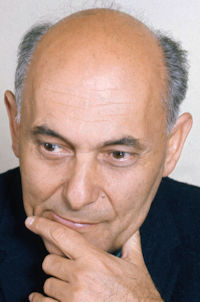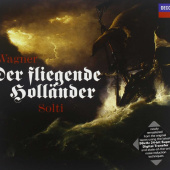Der fliegende Holländer

| Georg Solti | |||||
| Chicago Symphony Chorus and Orchestra | ||||||
Date/Location
Recording Type
|
| Daland | Martti Talvela |
| Senta | Janis Martin |
| Erik | René Kollo |
| Mary | Isola Jones |
| Der Steuermann Dalands | Werner Krenn |
| Der Holländer | Norman Bailey |
From the first bars of the overture it is clear that this major orchestra is ideal for this colorful score and has been captured in excellent stereo. The strong impression continues as the fine chorus and soloists are added to the mix in ideal listening balance with the orchestra, all under the galvanizing direction of Sir Georg Solti. Solti combines power and eloquence throughout the performance and brings a strong sense of drama and fine pacing to the work. He wisely avoids trying to make the entire score sound like later Wagner and plays the distinctive musical tone of each scene to the hilt, bringing a wonderful dramatic variety to the succession of scenes. His fine cast is well up to the challenge. Norman Bailey’s dusky baritone creates a vivid Dutchman and Janis Martin offers a Senta with warm, beautiful tone and dramatic commitment; only a very few high climaxes stretch her resources. René Kollo is a more lyrical Erik than usual, to the benefit of the role, and Martti Talvela is here a tower of vocal strength and vivid characterization. Highly recommended.
It was most fortuitous that these two sets arrived at the same time, as they make for a fascinating comparison. One is able to hear side by side one of the great Wagnerians of the recent past with one of the very finest of the current generation. It has to be said straightaway that the Solti Dutchman was not generally considered as one of his better achievements in the studio. In a recent Gramophone survey that looked at all the (then) currently available versions of Wagner’s first real masterpiece, Alan Blyth dismissed the Solti Chicago recording as being “marred not only by his abrupt, blatant treatment of the score and by unidiomatic playing from the Chicago orchestra, but also by indifferent singers”. He went on to pick fault with most of the cast, finding praise only for Martti Talvela, whose “characterful Daland remains as sole asset”. Many other general guides also found this recording to be probably the weakest of Solti’s entire Wagner cycle, certainly nowhere near the achievement of his Ring or Tannhauser. It would be interesting to hear what Blyth will make of the new Teldec Dutchman. Barenboim’s approach in so many ways represents the antithesis of the hard-driven Solti, and coming, as it often does with this conductor, on the back of recently staged performances, the resulting electricity and spontaneity are indeed impressive.
I have to confess here to a slight partiality regarding the Solti. When I was a music student in the late 1970s, the music library at the time held only one version of Dutchman, this very one. I remember playing it many times, and always wondered why it had been so poorly received. Now, after a twenty-odd year gap, I can plainly hear the good and the bad in this performance. For a start, when one has experienced the earlier Decca approach, masterminded by John Culshaw, where the listener is given a truly theatrical aural production, complete with tasteful special effects, Solti’s Dutchman does seem remarkably studio bound. This is most obviously apparent in the ‘supernatural’ elements of the score – the arrival of the Dutchman’s ship, the ‘yo-ho’s’ from Daland’s crew across to the ghost crew at the start of Act 3, where the two male choruses appear to be side by side. Barenboim’s engineers have tried to at least give us a taste of the theatre, with good spatial separation and the odd touch of reverb echo. This is, of course, a personal thing, and would not bother some listeners one jot if the actual performances were any good. This is where the comparisons get interesting.
The conducting of Barenboim seems to me to be virtually ideal in all important respects. Take the Overture. The timings from both conductors are remarkably similar, Solti taking 11’05 against Barenboim’s 10’19. Solti’s extra seconds come mainly from using the revised version, with its extra ‘Tristanesque’ transformation cadence added to the end, so the timings are extremely close, and yet the results are very different. Solti maintains a fairly consistent, quick-ish pulse which is fine as far as it goes, but seems prosaic and a tad dull beside Barenboim. In his hands, the ‘salty sea air’ which pervades this music really comes through, and the ebb and flow of the internal tensions in the music is made to feel tangible. Wagner’s consistent use of diminished sevenths (so criticised by Berlioz) is varied in Barenboim’s hands, and he adopts the Furtwängler idea of a ‘breathing pulse’ which lets the contours of each phrase surge and then pull back, very effective in music of this sort. This approach is adopted throughout, with long paragraphs of the score varied from within, the orchestra following his every twist and turn. There is nothing wrong with Solti’s conducting, it just doesn’t seem to bring the music alive quite as effectively.
The casts in the two recordings have their strengths and weaknesses. Of the two title characters, I found most satisfaction from Falk Struckmann. He is a Barenboim regular, having sung superbly in the latter’s Lohengrin and making a memorable impression as Kurwenal in Tristan. Here he is able to really dominate, and his tortured Dutchman comes over as virile and masculine, yet understandably anxious and even vulnerable. Norman Bailey is good vocally, though a touch strained in the upper register, but appears too avuncular and ‘comfortable’ in the part. The first great monologue ‘Die Frist ist um’ (the time is up) gives us the two basic approaches to perfection. Struckmann (encouraged by Barenboim) makes the aria into a mini-opera in its own right, pointing words more effectively and building climaxes inexorably, where Bailey sounds too polite and gentlemanly. Some of his more introspect moments are convincing, but Struckmann scores in nearly every scene, especially as things hot up.
I have reservations about Jane Eaglen’s portrayal of Senta. Of course she is capable of great contrast and her vocal ability is admirable, but she doesn’t convey enough of the fiery spirit of the girl, and consistently sounds too mature for the part. She tones the voice down for her famous Ballad (which Barenboim transposes up to its original key of A minor), but when things get feverish, the voice spreads uncomfortably, approaching a squall in places. There are many good things (her first meeting with the Dutchman is effective) but it is a little uneven overall. In the Solti set Janis Martin, who was criticised originally for being too girlish and one-dimensional, now sounds quite convincing. Her dreamy idealism fits the bill, and she certainly is sweet-toned and naive enough to be a young Wagner heroine. The voice has a slightly quicker vibrato that sounds strained in places, but doesn’t produce as much of a beat as Eaglen. Overall, I found much to enjoy in her performance.
Barenboim’s Erik is Peter Seiffert (a one time Steersman for Sinopoli) who has already recorded the part for the outstanding Naxos set under Pinchas Steinberg. Here, ten years on, his voice is not quite as fresh, though the interpretation has matured. Seiffert has blossomed under Barenboim (he sings a superb Lohengrin for him) and he uses his experience to make the most of what can be a rather wimpish, thankless role. He is certainly in better voice than Rene Kollo, who sounds strained almost all the time for Solti. At his best (say in the RCA Die Tote Stadt ) he is a great artist, but too often in the big Wagner roles he doesn’t sound up to the job. It wouldn’t surprise me to see Barenboim’s Steersman as a future Erik – and more. The Spanish tenor Rolando Villazon sounds for all the world like a young Domingo, and gives a touching portrayal of the virile but naïve youth that is exciting and convincing. Old hand Werner Krenn does what is required of him for Solti.
There is not much to choose between the two Dalands, though on balance I think I prefer the greater variety of Martti Talvela, also recording the part for the second time. Robert Holl, who certainly has a magnificent voice, sounds a shade under-characterised by comparison.
So, pros and cons for both sets. The Solti is now at mid-price, and though in re-mastered analogue sound, is full and resonantly clear, well up to Decca’s house standards. The Teldec sound is demonstration worthy, with voices superbly placed and the rich carpet of orchestral tone sounding sumptuous and rich. Orchestral playing on both sets is first-rate, though I feel the palm must go to Barenboim here, the German orchestra producing marvellous string unanimity and wind and brass playing that is not crude or brash, just thrilling and vital. Choruses on both are excellent. The Teldec booklet note is by current Wagner expert Mike Ashman, who always gives a provocatively different angle on familiar music. The Decca booklet produces a long and wonderfully detailed account of the opera’s genesis from much-missed Wagner scholar Deryck Cooke.
The Solti set should not be written off as one of his Wagnerian ‘also-rans’ – there are too many good things in it, particularly Janis Martin and Martti Talvela. But Barenboim’s set is a superb climax to his Wagner series, by any standards one of the best of recent years. Older collectors will have their firm favourites (Keilberth and Klemperer come to mind) but younger music lovers coming new to this score will find on the Teldec a sense of real discovery, of a conductor still thrilled by the inspiration of Wagner’s ground-breaking vision.
Tony Haywood
Wagners Fliegender Holländer steht auch für eine neuartige Behandlung des Orchesterparts – vor allem die Ouvertüre ist geradezu revolutionär in ihren naturalistischen Klangeffekten: Die Darstellung von Sturm und Gewitter mit wogenden Streicherwellen, die sich am Ufer oder dem Schiffsrumpf brechen, und pfeifenden hohen Bläsern, die den Wind in der Takelage oder die Blitze über dem Meer darstellen mögen, gelingt weitaus “echter” als in der Gewitterszene von Beethovens Pastorale. Schaut man in die Partitur, dann fordert Wagner für die Ouvertüre ein Allegro con brio. Tempi sind (auch) Auslegungssache, aber zumindest Otto Klemperer und Antal Dorati entfachen in ihrer ruhigen Lesart eher einen steifen Wind als einem Sturm. Und schon habe ich Gelegenheit, die Aufnahme von Georg Solti mit dem Chicago Symphony Orchestra zu verteidigen. Solti lädt den Orchesterpart nämlich mit einer geradezu orkanartigen Dramatik auf, und ginge es allein um die Ouvertüre, so wäre seine Einspielung mit dem exzellenten nordamerikanischen Klangkörper allererste Wahl. Doch während Solti für den Ring mit wenigen Abstrichen die besten Wagner-Interpreten seiner Zeit zur Verfügung standen, muss er jetzt mit Sängern zweiten Ranges vorlieb nehmen. René Kollo ist ein hervorragender Erik und Marti Talvella immerhin ein guter Daland (wenn auch nicht so gut wie unter Klemperer), aber Norman Baileys Holländer klingt trocken, monochrom und überfordert – wer glaubt, Fischer-Dieskau habe sich am Holländer verhoben, sollte erst einmal Bailey hören und wird den deutschen Bariton gnädiger beurteilen … Janis Martin singt eine solide Senta, gewiss mit kleinerer Stimme als Rysanek oder Varnay und längst nicht so imaginativ wie Silja, aber allemal auf einem Niveau, das sie neben Kollo oder Talvela nicht abfallen lässt. Es ist und bleibt der enttäuschende Holländer, der Soltis Aufnahme zur problematischen Wahl macht.




